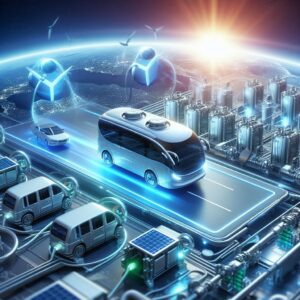In the pursuit of sustainable energy, hydrogen fuel cells have emerged as a transformative force in the transportation sector. These fuel cells, harnessing the power of hydrogen and oxygen to generate electricity, stand at the forefront of clean energy solutions, offering a promising alternative to conventional fossil fuel-powered vehicles. As the world grapples with environmental concerns, hydrogen fuel cells pave the way for a greener, more sustainable future in transportation.

The Promise of Hydrogen Fuel Cells
At the core of hydrogen fuel cells lies their ability to produce electricity through an electrochemical process, emitting only water vapor as a byproduct. Unlike traditional combustion engines, hydrogen fuel cells offer a zero-emission solution, making them an attractive prospect for reducing greenhouse gas emissions and combating air pollution.
Revolutionizing Transportation
Hydrogen fuel cells hold immense potential for diverse modes of transportation, including cars, buses, trucks, and even trains. Fuel cell vehicles (FCVs) boast extended ranges and faster refueling times compared to battery electric vehicles.
Challenges and Progress
Despite the promise, challenges persist in the widespread adoption of hydrogen fuel cells. Infrastructure limitations, such as the availability of hydrogen refueling stations, pose a hurdle to the mass market penetration of FCVs. However, ongoing research, technological advancements, and infrastructure investments are steadily addressing these challenges.
The Future of Clean Transportation: Hydrogen Fuel Cells Solutions
The future of hydrogen fuel cells in transportation looks promising. As advancements in technology and infrastructure continue, the cost-effectiveness and accessibility of hydrogen-based vehicles are expected to improve. Partnerships between governments, industries, and research institutions play a pivotal role in fostering the growth of hydrogen fuel cell technology.
Hydrogen fuel cells stand as a beacon of promise in the realm of sustainable transportation, offering a path towards a cleaner, greener future. These cells, harnessing the power of hydrogen and oxygen to generate electricity.
The transformative potential of hydrogen fuel cells extends across various modes of transportation. Fuel cell vehicles (FCVs) tout impressive features including extended ranges and rapid refueling times, rivaling conventional vehicles in performance while offering a zero-emission solution.

However, challenges loom on the path to widespread adoption. Infrastructure limitations, particularly the scarcity of hydrogen refueling stations, hinder the mass-market penetration of FCVs. Despite these hurdles, ongoing advancements in technology, coupled with strategic investments in infrastructure development, are progressively addressing these challenges.
The future of clean transportation appears buoyant with the evolution of hydrogen fuel cells. Collaborative efforts between governments, industries, and research institutions are driving innovation and paving the way for a more accessible, cost-effective, and environmentally sustainable transportation ecosystem.
Conclusion: Driving Towards a Greener Tomorrow
Hydrogen fuel cells represent a beacon of hope in the quest for cleaner transportation. As a zero-emission alternative, they offer a compelling solution to mitigate the environmental impact of conventional vehicles. As technological advancements and infrastructure developments progress, hydrogen fuel cells are poised to redefine the future of transportation.
For more Article like this, visit our Website Here
